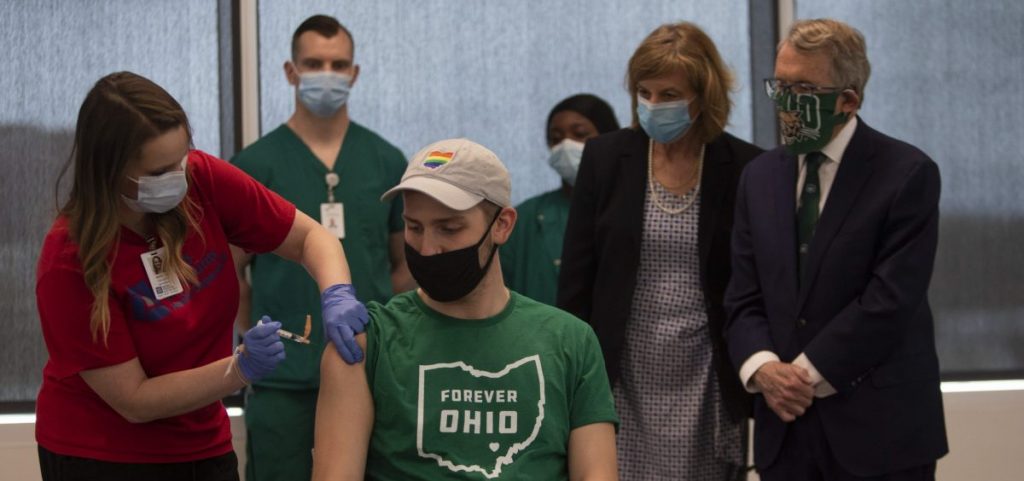News
Ohio University students who didn’t follow vaccine mandate allowed back but face testing
By: David Forster
Posted on:
ATHENS, Ohio (WOUB) — When universities issued their COVID-19 vaccination mandates last semester, students were given a choice: Get vaccinated or apply for an exemption.
Some students did neither.
With the start of spring semester, universities are taking different approaches when it comes to students who did not comply with the mandates.
Some took a hard line. Miami University canceled the registrations of students who failed to comply. It was a small number: just eight students.
The University of Pittsburgh took the same approach, but did not say how many students were affected.
Ohio State University told its noncompliant students they could not return to campus but could enroll in online-only classes.
Students at Kent State University who did not comply were allowed to return to campus for classes, but a hold will be placed on their registrations for classes after spring semester. The students must get tested twice a week.

Ohio University President Hugh Sherman said the number of noncompliant students there is very small and emphasized that the point of the mandate was to get as many people vaccinated as possible.
“I would argue that we were extremely successful,” he said. “When we started out I certainly did not expect to get 91.6 percent of the campus vaccinated.”
That’s the figure for faculty, staff and students on the main campus. Vaccination rates for the university’s regional campuses are lower, in particular because a much smaller percentage of students on those campuses got vaccinated than on the Athens campus.
Sherman said it was expected that a certain percentage of students were not going to get vaccinated.
“We’ve got people throughout the state who have very strong personal opinions – political and religious opinions – about why they don’t want to take a vaccination,” he said. “We respect those people to disagree.”
Those people were given the option under the mandate to apply for an exemption, and Sherman said the university didn’t turn anybody down if they asked for one. So there was no point in penalizing students who didn’t get vaccinated and didn’t seek an exemption either since they would have been granted one anyway.
“I didn’t see any purpose in preventing those people who obviously weren’t going to go get a vaccination … from coming back and getting their education,” Sherman said.
Students who are not vaccinated must be tested weekly for COVID-19. Students living on campus and those who are members of sororities and fraternities also must test weekly regardless of their vaccination status.
Students who do not comply with the testing requirement can be referred to the university’s Office of Community Standards and Student Responsibility. This starts a process that can lead to a recommendation that the student be suspended or expelled.
It’s not clear how long this process would take and Sherman acknowledged it’s possible it may drag out long enough that a student goes much of the semester without getting tested. He said the university will not prohibit these students, who may at some point have COVID-19 and not know it, from attending classes in person in the interim.
Sherman said he is confident the university’s masking requirements for indoor spaces will keep the students and faculty in classrooms safe. He said all of the contract tracing done last semester resulted in just one case in which the virus may have been transmitted in a classroom.
If students refuse to wear a mask in a classroom, action can be taken immediately to remove them, Sherman said. The university is also encouraging students and employees to wear higher-filtration masks and will be making those available at locations around campus.
The Athens area is seeing a surge in COVID-19 cases, driven in large part by the highly contagious omicron variant. This surge began before the students returned, but with students now back on campus, the Athens County case numbers are seeing big gains in the age brackets that include these students.
Since Friday, 939 new cases have been reported in Athens County, a significant increase over previous weeks. Of these, 662, or just more than 70 percent, were in the age brackets that range from zero to 29 years. It’s not clear how many of these are college students, but the university has seen a significant increase in the number of students testing positive.
It may be tempting to look at these numbers and assume that infected students will drive up the case numbers elsewhere in the community. But this is not the case, said Dr. James Gaskell, health commissioner for the Athens City-County Health Department.
Gaskell said the department’s contract tracing shows little transmission from the university students to the broader community. This is because the students and the community tend to exist mostly in their own bubbles, he said. And what interactions there are between them, such as at a grocery store, typically don’t last long enough to spread infections.
“Everybody says the reason the community is having such a high incidence of disease is because the students are causing infection in the community,” Gaskell said. “Well, by and large that’s not true. They operate in their own bubble. In other words, they get infected, but they don’t infect the rest of the community.”

